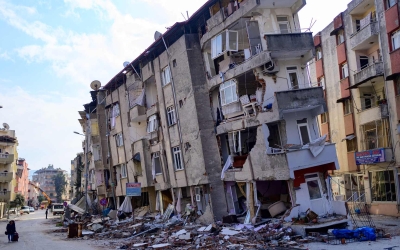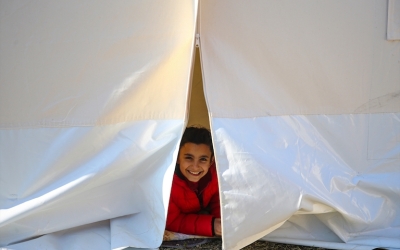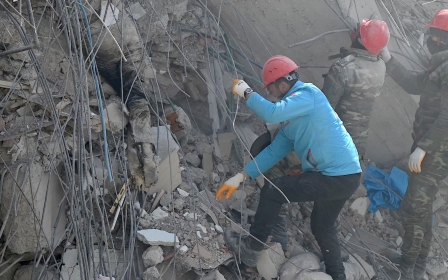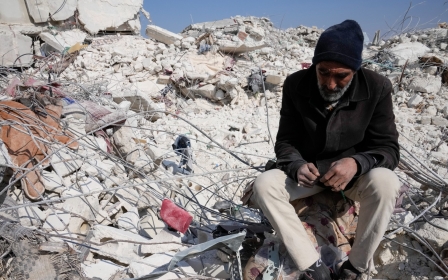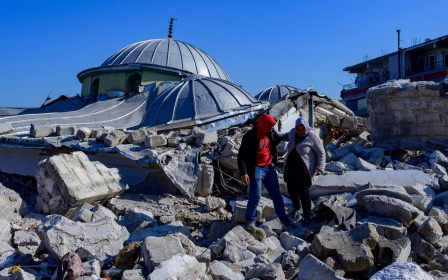Turkey earthquake: Lack of clean water and toilets puts survivors at risk of disease
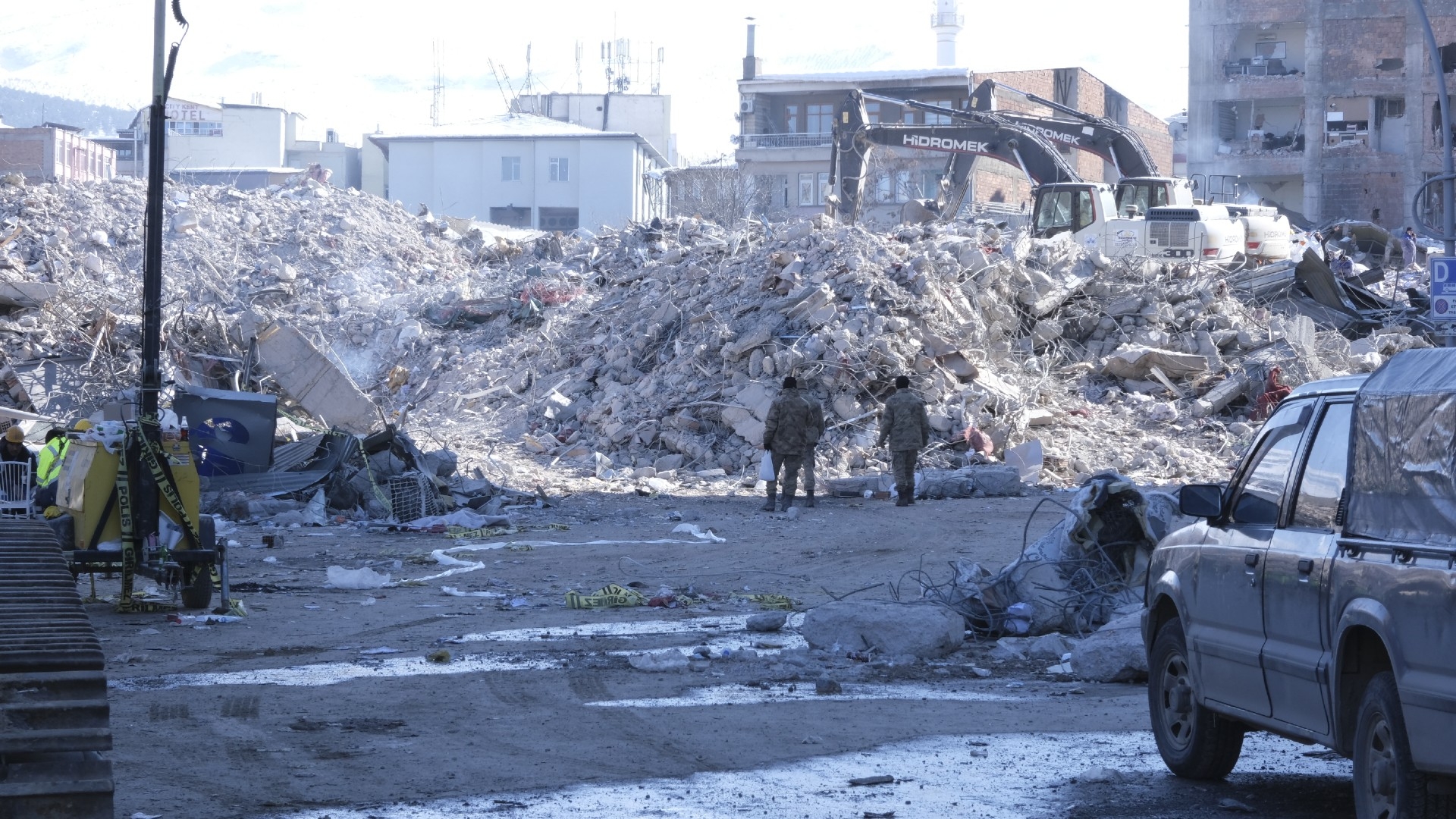
The acrid smell of smoke from hundreds of fires used to keep survivors warm has filled Malatya's air.
Looking around, families are standing amid towering piles of rubble that were once their homes, determined to find their loved ones buried below.
Some hack away at the debris for hours on end, in the hope they may find someone still alive.
Others stand at the roadside, with concern and anxiety clearly etched on their faces.
'People in the earthquake-affected areas urgently need safe drinking water and latrines'
- Marielle Snel, Save the Children
This southern Turkish city, which once boasted a population of more than 500,000 people, has been destroyed beyond recognition since last week's devastating 7.8 and 7.5 magnitude earthquakes.
New MEE newsletter: Jerusalem Dispatch
Sign up to get the latest insights and analysis on Israel-Palestine, alongside Turkey Unpacked and other MEE newsletters
Scores of buildings were reduced to rubble in downtown Malatya on 6 February, in the deadliest natural disaster to strike Turkey in its modern history.
On Tuesday, Turkish President Recep Tayyip Erdogan said the death toll stood at a staggering 35,418, surpassing figures from the 1939 quake which decimated Erzincan province.
Standing near a tent that she now calls home, Gulten, one of the city's thousands of internally displaced people, told Middle East Eye that despite being extremely cold, as the weather fell below -8c at night, her situation was gradually improving.
"They are building a container city. Soon we'll get rid of these tents," she said.
'Absence of hygiene'
Tens of thousands of people lost their homes and belongings to the quake, but fears are growing that the disaster could now expose survivors, especially women, girls and newborns, to disease.
Many of Malatya's residents told MEE that their biggest concern was when they would have access to potable water, after amenities such as toilets and showers all but vanished when the first tremor struck.
Within hours of the first quake, the local government issued an advisory that residents had to use bottled water over tap water amid fears the water supply may have been contaminated.
"Do not drink tap water until the second notice," the Malatya governorate said in a written advisory.
Now, 10 days on, with no new advisory having been released yet, many are getting restless after being unable to shower and they are relying solely on bottled water to drink.
"It's not sustainable," a man said while waiting in a queue to get food from the Turkish Red Crescent. "We have bottled water to drink but the main problem is the absence of hygiene."
Urgent need for safe drinking water
With no water or a functioning sewage system, several of Malatya's residents were starting to worry about diseases potentially spreading after reports of diarrhea emerged.
"Clean water means you can have a bath; you can go to the toilet," Gulten said.
While portable cabin lavatories have begun to spring up across several quake-hit areas, demand has far outstripped supply.
In the southern city of Antakya, a set of portable blue and white toilets was completely overwhelmed by use, with excrement overflowing onto the pavement.
The charity Save the Children has warned that both Turkey and neighbouring Syria are urgently in need of humanitarian aid to stave off a public health emergency.
"People in the earthquake-affected areas urgently need safe drinking water and latrines. It's challenging as water pipes are broken," said Marielle Snel, the senior global humanitarian water sanitation and hygiene advisor at Save the Children.
"Once the latrines are in place, waste needs to be safely disposed of to avoid risk of waterborne and vector-borne diseases.
"Sanitation facilities need to be built in a way that considers the safety of women and girls. There needs to be adequate privacy and lighting so they can use facilities without feeling unsafe."
Sitting exhausted in the freezing temperatures, a policeman echoed her concerns.
"The main problem is water. Look, people use the streets as restrooms."
'We can overcome'
Despite the city being largely ruined, bulldozers and other construction vehicles could be seen clearing the roads, with some traffic lights and street lights now functioning.
In certain parts of Malatya, residents could also be seen going to shops and supermarkets, reviving some of the normalcy that was stolen by last week's tragedy.
"The security problem is over," said the policeman, who didn't want to give his name, as he was not authorised to speak to the media.
"Police, soldiers, and rangers are everywhere in the city."
With UN authorities saying the rescue phase was nearing a close, and the focus shifting to shelter, food and schooling, some residents said they believed the worst had passed, following Erdogan's pledge to rebuild.
The president said on Tuesday that a damage assessment of the buildings would be completed within a week and reconstruction could begin within a matter of months.
"Things are better now. In the first two days, it was awful as there was not even bread to eat," Mehmet Ali Kalan, a telephone engineer told MEE.
"We, Malatya's residents can overcome this problem."
Middle East Eye delivers independent and unrivalled coverage and analysis of the Middle East, North Africa and beyond. To learn more about republishing this content and the associated fees, please fill out this form. More about MEE can be found here.


